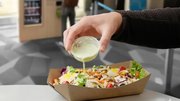Vending
COVID-19 and convenience services: 'New normal' demands flexibility
Three veteran operators from different parts of the country gave an overview of how their operations have changed during a webinar last week presented by the National Automatic Merchandising Association.

May 4, 2020 by Elliot Maras — Editor, Kiosk Marketplace & Vending Times
What's the "new normal" for convenience services now that the coronavirus pandemic has disrupted their routines? A panel of operators addressing this topic during a webinar last week made it clear that companies need to rethink standard operating practices and be flexible.
Three veteran operators from different parts of the country gave an overview of how their operations have changed during a webinar last week, "Pivioting for high performance: What operators should be doing today for a winning tomorrow," hosted by the National Automatic Merchandising Association.
Unsurprisingly, the webinar, sponsored by PepsiCo Foodservice, drew the largest operator listenership ever, said moderator Eric Dell, executive vice president of NAMA external affairs.
Convenience service operators were clearly anxious to hear what industry veterans are doing to monitor customer activity, sustain sanitation standards, educate customers and assess new business opportunities.
Technology pays
The panelists agreed that the crisis caused by location closures and downsizing has underscored the importance of remote machine monitoring, a technology that enables them to track account activity in a timely manner.
"We were able to adjust our route volumes and consolidate routes," said panelist Jeff Smith, chairman and CEO, All Star Services Inc., Port Huron, Michigan.
Panelists Niki Morton, executive vice president, Casco Bay Food & Beverage, Lewiston, Maine, and Lance Whorton, president and CEO of Imperial Company, Tulsa, Oklahoma, agreed with Smith.
Sanitation rules
Sanitation was a focal point of discussion.
Whorton's company has stressed sanitation of all surfaces and has promoted touchless payment systems. The company has focused on sanitizing not only its own facility and customer facilities, but its vehicles.
Smith's employees have their temperature checked when they enter the building and are required to turn in the information to HR. All visitors must also have their temperatures checked before entering the facility, he said, and all employees wear masks every day all the time.
The company also provides customers information about what route drivers and technicians will be doing when they visit the accounts. Smith doesn't think these practices will change in the future.
Rotating product in the warehouse has also become more critical, said Morton. As population counts have changed, it's important to make sure outdated product is not left in the machines.
"The demand has lessened considerably as several of our customers have closed," she said.
Who has the sanitation supplies?
The lack of available sanitation supplies was cited as a challenge by all the panelists. Dell said NAMA will provide members information on personal protective equipment sources.
To address this issue, Morton's company has made its own home made sanitizer.
She added that it's important to use CDC recommended disinfectants. Companies should not use ammonia or bleach on micro market kiosks or digital screens, for example, or spray disinfectant directly on machines.
Customers need to be educated about proper cleaning practices as well, she said.
The need to prevent COVID-19 gives operators another reason to discourage the use of cash, which some customers prefer to pay with.
To protect his employees, Smith said cash is not touched in the counting room for 24 hours, as recommended by the CDC.
Cash handlers at Morton's company wear gloves when handling cash.
One listener asked if the virus can penetrate snack packaging, which would require individual packages to be sanitized. NAMA's Dell said he believes the FDA has stated that the virus does not transmit food packaging.
More communication
The panelists agreed that ongoing communication with customers and employees is critical.
All have provided literature for drivers to give to people at locations about sanitation practices.
Morton added she uses email to let customers know they are keeping both their own and customer employees safe. She said it is also important to be flexible with customers, as some want to know in advance when a service person is going to be coming to their location.
In addition to discussing servicing, Whorton said he makes a point of asking customers what types of disruptions they are addressing on account of COVID-19.
"We love to ask the question, 'what are you struggling with?'" he said.
"It's turned us into being a very nimble, very flexible organization," Smith said. "You can't structure anything in concrete and say that's the way we're going to do it."
New opportunities?
A lot of discussion addressed new business opportunities.
Morton said her company has expanded its pantry service as vending and micro market business has decreased. Pantry service provides a way for some accounts to show their appreciation to their employees.
"We've been able to provide thousands of boxed lunches," she said.
Smith said his company is similarly exploring "care boxes" for people working at home. The employers sponsor the care boxes.
One listener asked the panelists if they are considering providing coffee and water machines to people in their homes. The panelists all said they have not explored this but said the idea has merit.
Whorton and Smith said they are considering using their fleets to expand into delivery for restaurants, although they were not doing it at present.
Breakroom design was also cited as an opportunity. With social distancing requirements, convenience service operators have an opportunity to redesign break rooms to accommodate the new requirements, Whorton said. He said convenience service operators can become experts in this for their customers.
To prepare locations for account reopenings, NAMA will provide operators separate check lists for vending micro markets, vending and coffee service, Dell said. Drivers will be given these check lists when visiting customers.
For an update on how the coronavirus is affecting convenience services, click here.
About Elliot Maras
Elliot Maras is the editor of Kiosk Marketplace and Vending Times. He brings three decades covering unattended retail and commercial foodservice.







